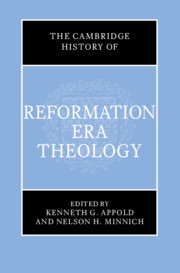Book contents
- The Cambridge History of Reformation-Era Theology
- The Cambridge History of Reformation-Era Theology
- Copyright page
- Contents
- Figures
- Acknowledgments
- Contributors
- Abbreviations
- Introduction
- Part One Theology in an Age of Cultural Transformation
- Part Two Schools and Emerging Cultures of Theology: Diversity and Conformity within Confessions
- Part Three Topics and Disciplines of Theology
- 21 Method and Ethos of Theological Instruction and Discourse
- 22 Biblical Theology
- 23 Systematic Theology
- 24 Controversial Theology
- 25 Sacramental and Liturgical Theology
- 26 Pastoral Theology and Preaching
- 27 Reformation Ethics and Moral Theology
- 28 Ecclesiastical Law in Early Modern Europe
- 29 Spirituality in the Reformation Era (1500–1675)
- 30 Catholic Christianity and Indigenous Religions in the Americas
- 31 Jesuit Catechisms in Japan and India
- 32 Theology in China ca. 1582–ca. 1688
- 33 Theology and Science
- 34 Theology and History
- 35 Theology, Politics, and Warfare
- 36 The Role of Art in the Theological Discourse of the Reformation
- Index
- References
26 - Pastoral Theology and Preaching
from Part Three - Topics and Disciplines of Theology
Published online by Cambridge University Press: 27 September 2023
- The Cambridge History of Reformation-Era Theology
- The Cambridge History of Reformation-Era Theology
- Copyright page
- Contents
- Figures
- Acknowledgments
- Contributors
- Abbreviations
- Introduction
- Part One Theology in an Age of Cultural Transformation
- Part Two Schools and Emerging Cultures of Theology: Diversity and Conformity within Confessions
- Part Three Topics and Disciplines of Theology
- 21 Method and Ethos of Theological Instruction and Discourse
- 22 Biblical Theology
- 23 Systematic Theology
- 24 Controversial Theology
- 25 Sacramental and Liturgical Theology
- 26 Pastoral Theology and Preaching
- 27 Reformation Ethics and Moral Theology
- 28 Ecclesiastical Law in Early Modern Europe
- 29 Spirituality in the Reformation Era (1500–1675)
- 30 Catholic Christianity and Indigenous Religions in the Americas
- 31 Jesuit Catechisms in Japan and India
- 32 Theology in China ca. 1582–ca. 1688
- 33 Theology and Science
- 34 Theology and History
- 35 Theology, Politics, and Warfare
- 36 The Role of Art in the Theological Discourse of the Reformation
- Index
- References
Summary
This chapter deals with Catholic and Protestant theologies of preaching and the Christian ministry in the Reformation period. A word of clarification is necessary at the outset. The focus of this chapter is not on early modern preaching or pastoral care per se but on theological reflection on preaching and the pastoral office as such. In other words, this chapter is an exercise in the history of Pastoraltheologie, a term that encompasses more than the English “pastoral theology,” which in some contexts refers to a branch of practical theology that deals especially with pastoral care and counsel.1 The definition of pastoral theology adopted here is considerably broader; it includes all that relates to the pastoral office and ministry of the Christian church. Early modern Catholic and Protestant pastoral theologies will be examined briefly in turn.
- Type
- Chapter
- Information
- The Cambridge History of Reformation Era Theology , pp. 532 - 556Publisher: Cambridge University PressPrint publication year: 2023

